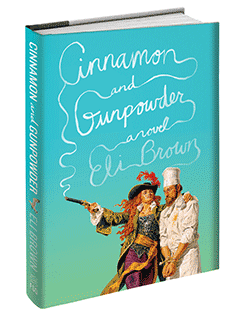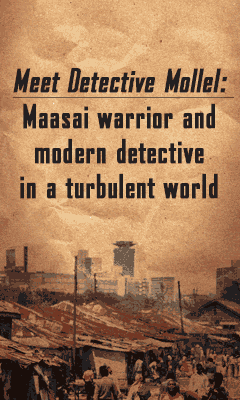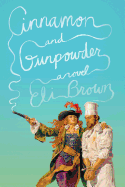Cinnamon and Gunpowder
by Eli Brown
Any author who combines wildly disparate topics in one plot takes a risk. The resultant effect is either that of flint and tinder or that of oil and water. Eli Brown (The Great Days) combines a swashbuckling piratical adventure with gourmet cooking, and his risk pays off--the two go together like filet mignon and red burgundy for a scrumptiously entertaining romp on the high seas in the year 1819.
When renowned chef Owen Wedgwood accompanies his longtime employer Lord Ramsey to a business meeting at a seaside summer home, his greatest worry is the condition of the pantry inventory at their destination and his lack of support staff. Although Wedgwood manages to create a fine feast as usual, it turns out to be his master's last: pirates crash the dinner, murder Ramsey at table and take Wedgwood captive. Although he vows to escape, Wedgwood knows how desperate his situation truly is, for his captors are not just any pirates but the crew of the Flying Rose, captained by the ruthless pirate queen Mad Hannah Mabbot. While beautiful, flame-haired Mabbot possesses untold charisma, she rules her crew with an iron hand and a predilection for bloodshed. Furthermore, she will allow Wedgwood to remain alive on one highly specific condition: he must whip up a delicious meal for her every Sunday. Like Scheherazade's stories, each meal will buy Wedgwood more time on this earth. Unfortunately, the Flying Rose's galley has little in common with the well-stocked pantry Wedgwood needs. Weevil-infested flour and hardtack aren't the stuff of gourmet meals. With his life at stake, Wedgwood must draw on his own resourcefulness and the few fresh ingredients he can gather from the sea or the ship's infrequent ventures into port. With little chance of escape, his greatest hope for rescue is Laroche, a privateer hell-bent on blowing Mabbot out of the water.
But Wedgwood slowly learns Captain Mabbot's murderous actions aren't without purpose. Lord Ramsey owed his wealth to a large stake in the Pendleton Trading Company, a tea empire akin to the East India Company, which owes much of its profits to the opium trade choking the life out of China. Mabbot yearns to bring the company down, but first she must catch up to the elusive professional thief known as the Brass Fox, a difficult prospect even when one isn't being pursued by English warships. To make matters worse, the Flying Rose has a saboteur aboard. While he's glad for her troubles at the outset, the more time Wedgwood--whom Mabbot takes to calling "Wedge"--spends with the eccentric captain, the more he comes to understand and sympathize with her. He also begins to forge alliances with her oddball but effective crew: Mr. Apples, an enormous, gruff warrior and devotee of the manly art of knitting; Feng and Bai, Mabbot's twin martial artist bodyguards; and Joshua, the deaf cabin boy who becomes Wedgwood's surrogate son. Eventually, Wedge must choose whose side he's really on: that of a society contributing to the suffering of millions of people, or that of the lawless pirate with whom he's falling in love.
Brown's culinary/piratical epic is meant to be savored like--and if possible, with--a rich meal and a fine bottle of wine. Admittedly "obsessed with food" himself, Brown creates an engrossing first-person narrative as Wedgwood stretches his prowess in the kitchen not merely to stay alive, but because of a deep and enduring passion for the profession of nourishing the body with delicious, wholesome food. The prose particularly shines during Wedgwood's descriptions of his successful meals, such as "basil-beef consomme... with its rainbow sheen of delicate oils trembling on the surface and a flavor that turned the tongue into the very sunlit hill where the bulls snorted and swung their heavy heads." Wedgwood and Mabbot's relationship is nurtured by his respect for her love of food: "When she ate, I saw in her a radiant life, a deep hunger, and an almost pious reflection on each moment." Readers hungrier for action than romance will find plenty to satisfy their appetites as well, with bloody battles, narrow escapes and gunplay galore.
For pure escapist pleasure, Cinnamon and Gunpowder has no match. A word of counsel, though: with passages such as "The saffron warmed all together as sunlight through stained glass blesses a congregation, while the shrimp sauce waved its harlot's kerchief from the periphery," you'll want to have a napkin on hand so you can dab your watering mouth. --Jaclyn Fulwood









 Tell us about developing the violent yet compelling Captain Hannah Mabbot.
Tell us about developing the violent yet compelling Captain Hannah Mabbot.  Vanilla Rose Amaretti
Vanilla Rose Amaretti